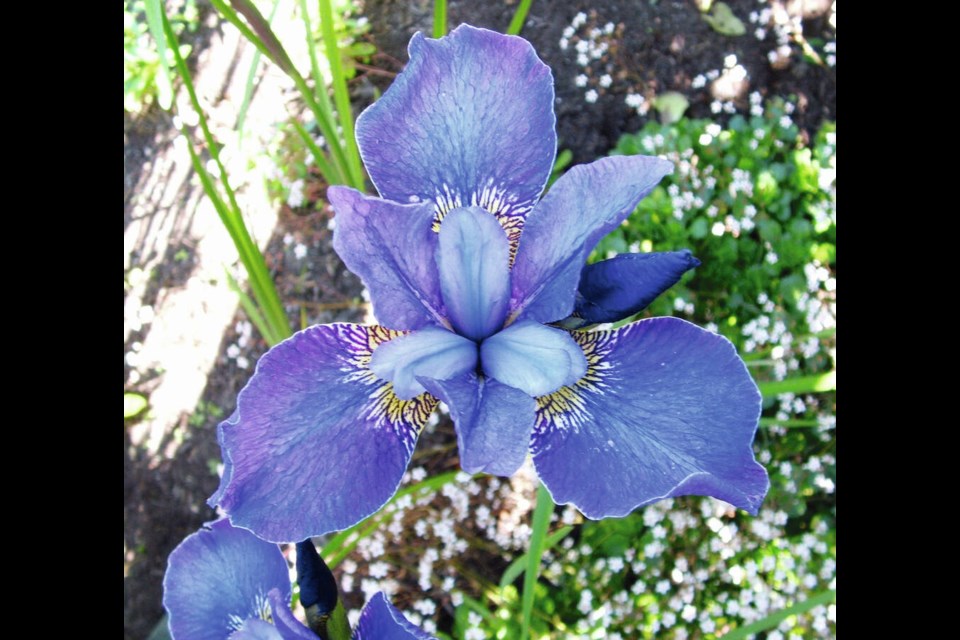Dear Helen: I am fond of the bearded irises in my garden, but their growth and flowering was a little disappointing this past spring and early summer. Should I be dividing the clumps? If so, when and how is this done?
I.S.
Diminished flowering, clumps that are overgrown or crowded, and a decline in general health in bearded (German) irises are common signs that a clump needs dividing. These irises usually need to be divided every few years. Depending on the variety and growing conditions, this can be anywhere from two to five years. For most, every three years is about right.
The ideal time for lifting, dividing and replanting these irises is right after flowering, in July or August. This gives ample time for new roots to become well established before the arrival of cold, wet weather.
When you do divide and replant, lift each clump carefully to avoid damage to the rhizomes. If the soil is dry, water the day before to make the lifting easier. Separate the clumps into divisions, each with at least one fan of leaves.
Cut the leaves back by around a half, making clean cuts with sharp scissors, and trim back any overlong roots. Trimming back the leaf fans reduces transpiration from the foliage and helps newly planted divisions to settle in. Check for damage, such as soft spots, on the rhizomes and discard any dubious ones.
Choose a planting site in full or nearly full sun, with a rich, loamy, pH neutral (not acid) soil that drains quickly of excess moisture. I form a ridge in each planting hole, so that I can settle the horizontal rhizome atop the ridge and arrange the roots down the sides before firming in the plant. The rhizome should end up just barely showing at the soil surface.
Avoid over-watering bearded irises. They prefer soils kept a little on the dry side.
You might consider expanding your interest in irises to explore the many lovely Siberian irises, plants with slender, grassy foliage. They are easy-growing, long-lived plants that require dividing less often, only when the flowers start to become smaller and fewer in number.
Dear Helen: I have a hardy white calla lily that has grown in the same spot for many, many years to produce lovely funnel-shaped summer flowers. My problem: The plant has begun to sprout far too early, in late autumn. That fresh growth is damaged in the snow and frost of winter. It does come back in the spring, but not with less vigour than usual and with only a few flowers. It has five new 20-cm shoots now. How do I protect them over the winter? We live on the Saanich Peninsula.
H.K.
In our climate, the usual life pattern of the hardy white calla lily (Zantedeschia aethiopica) is to die down in the fall and regrow in spring. In milder climates the plants are evergreen.
Perhaps the premature sprouting could be attributed to a warm, sheltered location, or to our warming weather. Either of these could possibly induce semi-evergreen inclinations in the plant.
Frosts used to arrive earlier in autumn than they do now. A warm autumn can trigger plants into manifesting their usual spring pattern of blooming (as in some rhododendrons) or putting out fresh green growth.
Another consideration, especially since the plant has been in the same location for many years, is that the clump may be reacting to being disagreeably congested. You might consider, in spring as fresh shoots begin showing, creating new plants by making clean cuts into the clump to remove one or two outside pieces for replanting in sites that are fully to almost fully sunny, in a rich, moist but well-drained soil.
Meanwhile, watch for predicted hard frosts and gently surround the shoots that have already grown with a mulch of chopped or small leaves, or/and chopped straw, with a light cover of old floating row cover or other lightweight material over the mulch. Remove the covering after freezing weather has passed.
GARDEN EVENT
Dinter open house. Dinter Nursery, 2205 Phipps Rd. in Duncan, is holding its annual pre-Christmas Open House and Local Makers Market on Saturday, Nov. 23, 10 a.m. to 3 p.m. Featured will be Christmas plants, swags and wreaths, a cafe with warm drinks and lunches, and vendors selling candles, baking, cards, pottery, soaps, birdhouses and more. Some vendors accept cash only.



